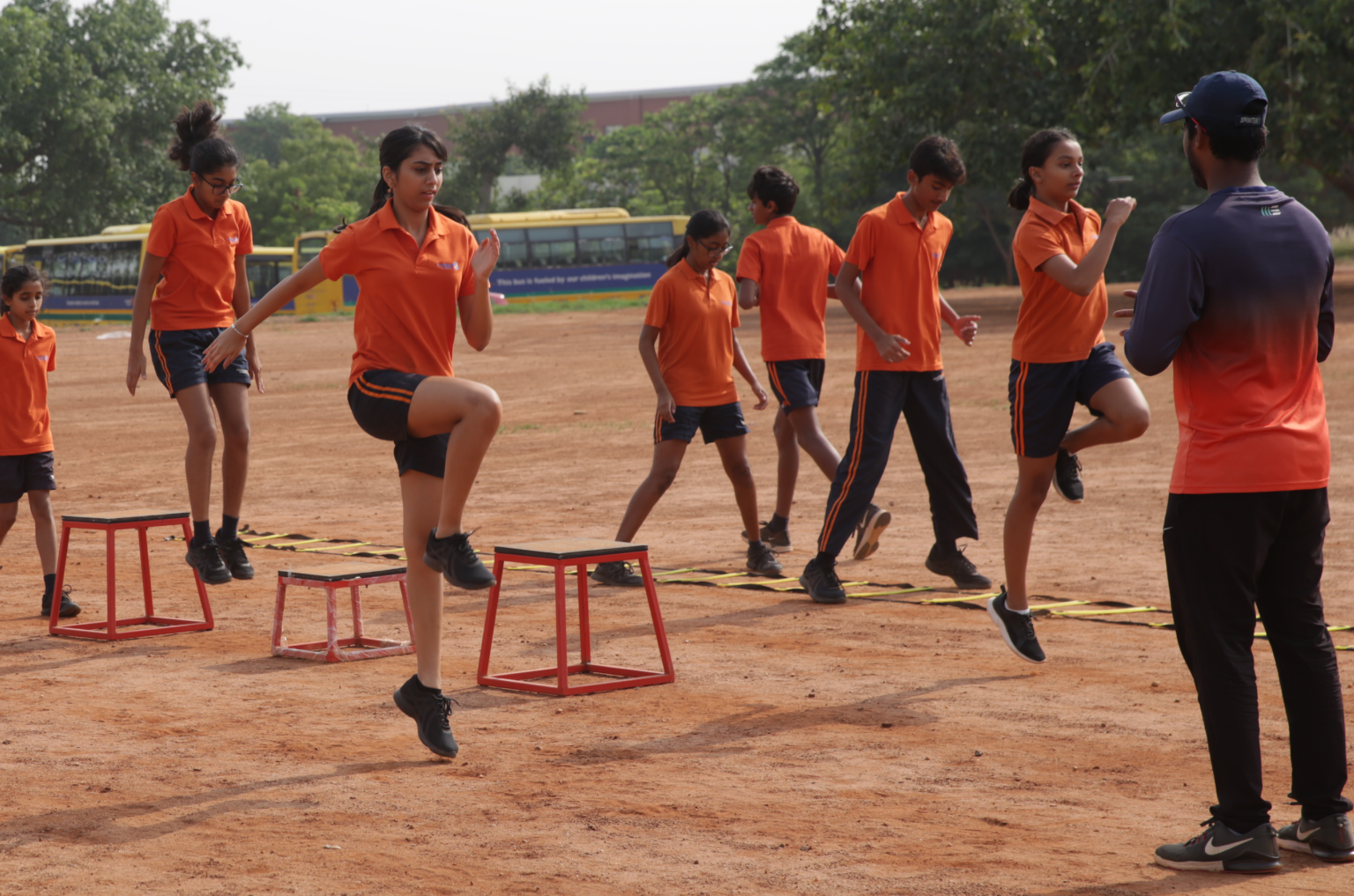Table of Contents
ToggleWhy Physical Education is crucial for student development
In today’s increasingly sedentary world, physical activity has become more important than ever. As technology continues to advance, opportunities for regular movement are dwindling, leading to a concerning rise in health issues among young people. Students, who spend long hours sitting at desks, often mimicking the sedentary lifestyle of corporate employees, are particularly at risk.
The lack of physical activity has contributed to an alarming increase in adolescent obesity, juvenile diabetes, and musculoskeletal disorders related to poor posture. These health problems can have a significant impact on a young person’s physical and mental well-being, affecting their academic performance, social interactions, and overall quality of life.
The importance of Physical Education in schools
Physical education goes beyond just being a class; it is a fundamental component of a child’s education. Here’s why:
Physical health benefits:
- Reduces obesity: Regular physical activity helps combat childhood obesity, a growing concern worldwide.
- Improves cardiovascular health: Engaging in physical activities strengthens the heart and lungs, reducing the risk of heart diseases later in life.
- Enhances bone density: Weight-bearing exercises like running and jumping contribute to strong bones, preventing osteoporosis.
- Boosts muscle strength and flexibility: Physical education helps develop lean muscle mass and flexibility,improving overall physical fitness.
Mental health benefits:
- Reduces stress and anxiety: Physical activity releases endorphins, natural mood elevators that can alleviate stress and anxiety.
- Improves sleep quality: Regular exercise can help regulate sleep patterns, leading to better rest and improved cognitive function.
- Boosts self-esteem and confidence: Success in physical activities can positively impact a child’s self-esteem and confidence.
- Enhances mood: Physical activity has been shown to reduce symptoms of depression and improve overall mood.
Cognitive benefits:
- Improves focus and concentration: Regular physical activity can enhance attention span and concentration,leading to better academic performance.
- Boosts memory and learning: Exercise has been linked to improved cognitive function, including memory and problem-solving skills.
- Enhances creativity: Physical activity can stimulate the brain and promote creative thinking.
Social benefits:
- Fosters teamwork and cooperation: Many physical activities involve teamwork, teaching children important social skills.
- Encourages healthy competition: Participating in sports can help children develop a healthy competitive spirit.
- Builds friendships and social connections: Physical education provides opportunities for children to interact with peers and form lasting friendships.
The Inventure approach to Physical Education
At Inventure Academy, we believe that physical education is an essential part of a well-rounded education. Our program is designed to foster a love for movement, promote healthy habits, and develop essential life skills.
Key elements of our physical education program include:
- Daily physical education: All Primary School grades participate in daily physical education classes, ensuring that they are active and engaged throughout the school week.
- Specialized sports training: Middle and senior school students have at least two hours of physical education per week, focusing on specialized sports training.
- Movement-first approach: Our program emphasizes fundamental movement skills before introducing sports, ensuring a solid foundation for athletic development.
- “First move well, then move often.” – Grey Cook of the Function Movement Systems
- After-school sports programs: We offer a variety of after-school sports programs for students who wish to further explore their athletic interests.
The benefits of Physical Education at Inventure
The benefits of physical education at Inventure Academy are far-reaching. Our program helps students:
- Develop physical fitness: Regular physical activity improves cardiovascular health, strengthens bones, and enhances muscle development.
- Improve mental well-being: Physical education has been shown to reduce stress, anxiety, and depression, while boosting mood and self-esteem.
- Enhance cognitive function: Exercise has a positive impact on cognitive abilities, including focus, concentration, memory, and problem-solving skills.
- Foster social skills: Participating in team sports and group activities helps students develop teamwork, cooperation, and leadership skills.
- Build character: Physical education instills values such as discipline, perseverance, and sportsmanship.
The Impact of Physical Education on academic performance
Studies have shown a strong correlation between physical activity and academic performance. Regular physical activity can improve cognitive function, attention span, and concentration, leading to better grades and overall academic success. Additionally, physical education can help students develop self-discipline, time management skills, and a positive attitude towards learning.
Physical Education and social-emotional development
Physical education plays a vital role in social-emotional development. Engaging in physical activities can help students build self-esteem, confidence, and a sense of belonging. Participating in team sports and group activities can also foster teamwork, cooperation, and leadership skills. These social-emotional skills are essential for success in both personal and professional life.
Physical Education and lifelong health
The benefits of physical education extend far beyond childhood and adolescence. Regular physical activity throughout life is essential for maintaining good health and preventing chronic diseases such as heart disease, stroke, type 2 diabetes, and obesity. By developing a love for movement and a commitment to physical activity at a young age, students are more likely to continue to be active throughout their lives.
Incorporating physical activity into daily life
Beyond the structured physical education programs in schools, it is important to encourage students to incorporate physical activity into their daily lives. This can include activities such as walking, biking, swimming, dancing, or playing sports. Schools can play a role in promoting physical activity by creating safe and accessible spaces for students to exercise, organizing after-school sports programs, and encouraging active transportation options.
Addressing the challenges of providing a quality Physical Education program in schools
Despite the numerous benefits of physical education, it is disheartening to see that many schools are reducing physical education time. This trend is particularly concerning in middle and high schools. The decline of physical education can be attributed to various factors, including increased academic pressure, budgetary constraints, and a lack of understanding of its importance.
- Budgetary constraints: Schools may need to allocate more resources to physical education programs, including hiring qualified physical education teachers and providing adequate equipment.
- Academic pressure: Schools can prioritize physical education by ensuring that it is a mandatory part of the curriculum and scheduling it during optimal times of the day.
- Lack of understanding: Educators and administrators need to be educated about the importance of physical education and its benefits for students.
Conclusion
Physical education is a crucial component of a well-rounded education. It offers numerous benefits for students, including improved physical and mental health, enhanced cognitive development, and strengthened social skills. By prioritizing physical education at Inventure Academy, we are investing in the holistic development of our students and preparing them for a successful future. It is essential that schools worldwide recognize the importance of physical education and take steps to ensure that all students have access to quality programs.
Frequently Asked Questions (FAQs)
Why is physical education important for students?
Physical education is crucial for students’ overall development. It promotes physical health, mental well-being, cognitive function, and social skills. By engaging in regular physical activity, students can improve their cardiovascular health,strengthen their bones, reduce the risk of obesity, and enhance their muscle strength and flexibility. Additionally, physical education can help students develop important social skills, such as teamwork, cooperation, and leadership.
How does physical education benefit mental health?
Physical activity has a positive impact on mental health. It can reduce stress, anxiety, and depression, while boosting mood and self-esteem. Regular exercise can also improve sleep quality, which is essential for overall mental well-being.
What are the key components of physical education?
A comprehensive physical education program should include a variety of activities, such as sports, games, dance,gymnastics, and fitness exercises. It should also emphasize fundamental movement skills, such as running, jumping,throwing, and catching. Additionally, a good physical education program should be taught by qualified instructors who can provide effective instruction and ensure student safety.
What is the link between physical education and health education?
Physical education and health education are closely interconnected. Physical education promotes healthy habits and behaviors through physical activity, while health education provides students with the knowledge and information they need to make informed choices about their health. Together, these two subjects can help students develop a holistic understanding of health and wellness.
What are the long-term benefits of physical education?
The long-term benefits of physical education include reduced risk of chronic diseases, improved quality of life, and increased overall well-being. By developing a love for movement and a commitment to physical activity at a young age,students are more likely to continue to be active throughout their lives, leading to a healthier and happier future.
How does physical education contribute to student development?
Physical education contributes to student development in many ways. It helps students develop physical fitness, mental resilience, cognitive skills, and social competencies. By participating in physical education programs, students can learn important life skills such as discipline, perseverance, and sportsmanship. These skills can be applied to various aspects of life, both inside and outside of the classroom.



